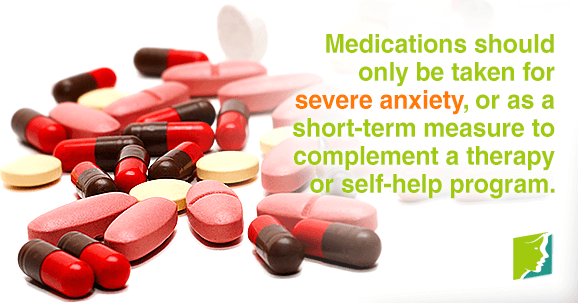Anxiety is a feeling of worry or fear, and it is a natural emotional response to distressing events. However, an anxiety disorder is a chronic feeling of worry that affects everyday life. There are many ways of dealing with anxiety, including medication, but this approach is not always the best. Read on for more information about anxiety medication and whether it is a good treatment for anxiety.
Dealing with Anxiety
There are a number of approaches when dealing with anxiety. Treatment can include self-help, therapy, and medication, lifestyle adjustments, or a combination of these. The precise route to follow is different for each person and depends on his or her individual circumstances. For this reason, you and your doctor are the people who can best decide on the right treatment path. Medication is generally the fastest method for relief, but it is not the best long-term solution.
Medications for Anxiety
Many different types of anxiety medication exist, and most come with risks and side effects. Therefore, therapy and self-help are generally the first methods to try, as they have no negative consequences and have longer-lasting effects. Medication should only be taken for severe anxiety or as a short-term measure to complement a therapy or self-help program. This is because medication will only treat the symptoms of anxiety, so relief only lasts as long as the pills are working in the body. There is also a risk of becoming addicted to these medications. Read on for information about some of the anti-anxiety medications available.
Benzodiazepines
These tranquilizers are the most widely prescribed medications for anxiety. They work by slowing down the central nervous system, resulting in a feeling of relaxation and calmness. Benzodiazepines are fast-acting and therefore useful for acute anxiety episodes or panic attacks. However, despite their positive effects, they also have drawbacks. Side effects can include sleepiness and fogginess, slurred speech, and memory lapses. The greater the dosage, the more prominent these side effects become.
Antidepressants
Medications developed to relieve depression have also been shown to reduce anxiety. The risk for dependency and abuse is smaller than with tranquilizers, which is why some people prefer these over traditional anxiety medications. They are not as fast acting, however, so they are more useful for relieving chronic anxiety than immediate symptoms. They work by regulating serotonin levels in the brain and elevating mood. Common side effects include nausea, sexual dysfunction, and sleepiness.
Recommendation
If you decide that medication is the right treatment route for you, it is important to be aware of the risks involved and talk to your doctor about your desires and concerns. Although pharmaceuticals can be helpful, they should not be seen as the only answer. Treating the underlying causes through counseling and lifestyle changes is the most effective way to find long-term, permanent relief from anxiety. Follow the links below for more information about anxiety and treatments.
Sources
- Anxiety and Depression Association of America. (2014). Facts & Statistics. Retrieved February 15, 2016, from http://www.adaa.org/about-adaa/press-room/facts-statistics
- National Health Service UK. (2016). Generalised anxiety disorder. Retrieved February 15, 2016, from http://www.nhs.uk/conditions/anxiety/pages/introduction.aspx
- National Institutes of Health. (2014). Anxiety. Retrieved February 15, 2016, from http://www.nlm.nih.gov/medlineplus/anxiety.html




